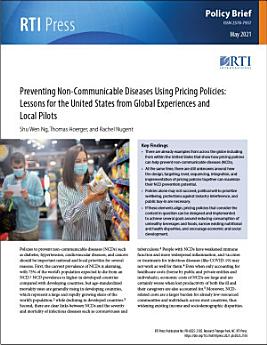Preventing non-communicable diseases using pricing policies
About this ebook
Nonetheless, policies alone may not succeed. Political will to prioritize well-being, protections against industry interference, and public buy-in are necessary. If those elements align, pricing policies that consider the context in question can be designed and implemented to achieve several goals around reducing consumption of unhealthy SSBs and foods, narrowing existing nutritional and health disparities, encouraging economic and social development. The US and its local and state jurisdictions should consider these pricing policy issues and their contexts carefully, in collaboration with community partners and researchers, to design multi-duty actions and to be prepared for future windows of opportunities to open for policy passage and implementation.
About the author
Shu Wen Ng, PhD, is Distinguished Scholar in Public Health Nutrition and an associate professor in the Department of Nutrition at the Gillings School of Global Public Health and the Carolina Population Center at University of North Carolina at Chapel Hill
Senior Fellow, Health Economics and Financing
Education
PhD, Economics, Northwestern University
MA, Economics, Northwestern University
BA, Economics, Carleton College
Thomas Hoerger, PhD, specializes in health economics, health care reform, and cost-effectiveness analysis and is the director of the Public Health Economics Program at RTI. Dr. Hoerger has led numerous research projects for the Centers for Disease Control and Prevention (CDC) and the Centers for Medicare and Medicaid Services (CMS). He has developed models for examining the cost-effectiveness of health promotion interventions and estimated the costs of diabetes, vision loss, and other conditions. He has directed a series of projects to design, implement, and evaluate competitive bidding for Medicare services. The purpose of the CDC-sponsored RTI-UNC Center of Excellence in Health Promotion Economics, which Hoerger directed, was to develop, evaluate, and implement health promotion recommendations, programs, and policies; to evaluate their cost-effectiveness; and, consequently, to improve upon efforts to promote health and prevent disease, disability, and injury.
Vice President, Global Noncommunicable Diseases
Education
PhD, The George Washington University
M.Phil., The George Washington University
Rachel Nugent, PhD, has more than 30 years of experience in global development as a researcher, practitioner, and policy advisor to governments. She leads a team charged with providing policy analysis, implementation, and evaluation of cost-effective strategies to prevent and control global noncommunicable diseases (NCDs). RTI’s global NCD experts generate and translate new evidence to help guide global and national decision-making aimed at noncommunicable disease detection, prevention, and control. In an effort to reduce premature mortality from these diseases, Dr. Nugent will coordinate capabilities including health economics and evaluation; communication and behavior change; epidemiology and survey research; establishment of disease and risk factor registries; and development of guidelines, care pathways, and medical technology applications for global NCDs.
Dr. Nugent is a member of the Lancet Commission on Noncommunicable Diseases and Injuries of the Poorest Billion, the U.S. Institute of Medicine Committee on Economic Evaluation, and the International Expert Group for the Global Nutrition Report. She also works with the World Health Organization Global Coordination Mechanism Working Group on Noncommunicable Disease Financing and is on the External Advisory Committee of the NCD Alliance and Children’s Heartlink.
Dr. Nugent's interests include the economic benefits of controlling antimicrobial resistance. She was the lead author and chair of The Race Against Drug Resistance, a 2010 report from the Center for Global Development’s expert working group on global drug resistance. The report produced four high-level recommendations to combat antimicrobial and other forms of drug resistance in diseases especially affecting poor countries, and it has been used extensively by the media and government agencies to guide the development of solutions to the epidemic of drug resistance globally.
Previously, Dr. Nugent was an associate professor of global health at the University of Washington and director and principal investigator of the Disease Control Priorities Network. She previously worked at the Center for Global Development, the Population Reference Bureau, the Fogarty International Center of NIH, and the Food and Agriculture Organization of the United Nations.





